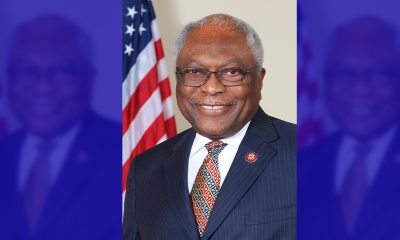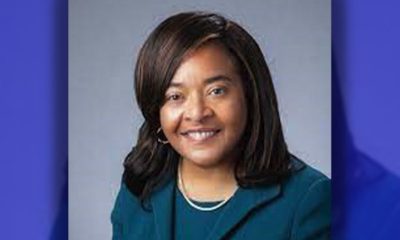Business
Why Fed Won’t Have a Big Impact on Your Loans Anytime Soon

MATTHEW CRAFT, AP Business Writers
PAUL WISEMAN, AP Business Writers
NEW YORK (AP) — Nobody knows when exactly, but the day will eventually come when the Federal Reserve nudges its benchmark lending rate from next to zero to something slightly higher.
When that happens, it will put upward pressure on borrowing rates throughout the economy — for credit cards, mortgages and student loans. But that doesn’t mean the era of incredibly low interest rates will soon be over.
The Fed’s chair, Janet Yellen, has taken pains to be cautious. On Wednesday, the central bank gave more signals that it will move slowly toward its first interest-rate increase in nearly a decade. By the end of the year, Fed officials expect the benchmark rate will reach 0.625 percent.
It was a different world the last time the Fed began a series of hikes. Rates were already much higher than today. In June 2004, the Fed lifted its benchmark rate from 1 percent to 1.25 percent. By the time the Fed was finished in 2006, the rate had reached 5.25 percent.
Nobody expects anything like that now. With the economy still growing slowly and inflation minuscule, rates will likely hover near historic lows. The Fed doesn’t want to ratchet up the monthly payments on your credit card. It’s in no rush.
“You’re going to see rates remain low for quite some time,” says Patrick Maldari, senior fixed-income specialist at Aberdeen Asset Management.
HOUSING
Many expect mortgage rates to creep higher this year. The average 30-year mortgage carries a rate of 3.7 percent, according to Freddie Mac. That’s close to a record low of 3.31 percent and compares with an average rate of 5.9 percent a decade ago.
Greg McBride, chief financial analyst at Bankrate.com, thinks homeowners ought to lock in mortgage rates as long as they remain below 4 percent. If you haven’t refinanced already, in other words, consider it soon.
Home loans won’t hinge on the Fed’s next move, though. Mortgage rates are closely tied to long-term interest rates, specifically the 10-year Treasury note. These rates are tethered to the Fed’s benchmark yet have plenty of wiggle room.
The 10-year yield has actually been falling over the past year. The reason? The Treasury market is dominated by global players. So when Europe’s economy runs into trouble, for example, traders around the world look for safety in the Treasury market, buying U.S. government bonds and pushing yields down. Another factor: The Fed is keeping a lid on yields by sitting on trillions of dollars of Treasurys following a huge bond-buying program that ended last year.
SAVINGS
It’s been a tough time for people socking away money in savings. On average, savings accounts pay an annual percentage yield of 0.09 percent, according to Bankrate.com. A one-year certificate of deposit pays a paltry 0.28 percent. For every $1,000 saved, in other words, the bank will give you $2.80. Ka-ching!
“Savings rates are nearly at zero and, unfortunately, I think depositors aren’t going to see much of a difference,” says Casey Bond, managing editor at GoBankingRates.
The Fed has signaled that it will raise rates slowly and carefully. A series of hikes large enough to lift yields on savings accounts, however, could put the economic recovery at risk by curbing lending and business spending. “Anything that would give savers a real boost would be too disruptive,” Bond says.
“I think people need to be focused on other things, like avoiding bank fees,” Bond says. “Fees can wipe out your earnings because savings rates are so low.”
CREDIT CARDS
Credit card rates could start to inch up once the Fed raises its benchmark federal funds rate — especially the low teaser rates credit card issuers use to entice people to sign up or shift credit card balances.
McBride advises that borrowers “grab those zero-interest balance transfers and introductory credit card rates. As the Fed moves away from zero interest rates later this year, credit card issuers will too. Chip away at your variable-rate debt now before interest rates start to climb.”
Credit card rates remain high — variable credit card rates average nearly 15.8 percent, according to Bankrate.com. But they could head higher if the fed funds rate goes up. That’s because credit card rates are based on the prime rate that banks charge their best customers, and the prime rate is based on the Fed funds rate.
INVESTMENTS
To judge by the stock market’s daily swings, investors fear the Fed’s first rate increase. Speculation that the Fed is preparing to move usually knocks stocks down. But the market has actually performed well in the face of rising interest rates. A recent report from UBS looked at the Fed’s initial rate hikes going back to 1954. It showed that the Standard & Poor’s 500 index rallied an average of 7.6 percent in the next six months.
Many investors are confident that as long as the Fed moves gradually, the stock market should be fine. That’s what happened in the last round of Fed hikes, in 2004. The S&P 500 finished the year with a 9 percent gain.
___
Wiseman reported from Washington.
Copyright 2015 The Associated Press. All rights reserved. This material may not be published, broadcast, rewritten or redistributed.
Activism
Oakland Post: Week of April 24 – 30, 2024
The printed Weekly Edition of the Oakland Post: Week of April 24 – 30, 2024

To enlarge your view of this issue, use the slider, magnifying glass icon or full page icon in the lower right corner of the browser window. ![]()
Bay Area
State Controller Malia Cohen Keynote Speaker at S.F. Wealth Conference
California State Controller Malia Cohen delivered the keynote speech to over 50 business women at the Black Wealth Brunch held on March 28 at the War Memorial and Performing Arts Center at 301 Van Ness Ave. in San Francisco. The Enterprising Women Networking SF Chapter of the American Business Women’s Association (ABWA) hosted the Green Room event to launch its platform designed to close the racial wealth gap in Black and Brown communities.

By Carla Thomas
California State Controller Malia Cohen delivered the keynote speech to over 50 business women at the Black Wealth Brunch held on March 28 at the War Memorial and Performing Arts Center at 301 Van Ness Ave. in San Francisco.
The Enterprising Women Networking SF Chapter of the American Business Women’s Association (ABWA) hosted the Green Room event to launch its platform designed to close the racial wealth gap in Black and Brown communities.
“Our goal is to educate Black and Brown families in the masses about financial wellness, wealth building, and how to protect and preserve wealth,” said ABWA San Francisco Chapter President LaRonda Smith.
ABWA’s mission is to bring together businesswomen of diverse occupations and provide opportunities for them to help themselves and others grow personally and professionally through leadership, education, networking support, and national recognition.
“This day is about recognizing influential women, hearing from an accomplished woman as our keynote speaker and allowing women to come together as powerful people,” said ABWA SF Chapter Vice President Velma Landers.
More than 60 attendees dined on the culinary delights of Chef Sharon Lee of The Spot catering, which included a full soul food brunch of skewered shrimp, chicken, blackened salmon, and mac and cheese.
Cohen discussed the many economic disparities women and people of color face. From pay equity to financial literacy, Cohen shared not only statistics, but was excited about a new solution in motion which entailed partnering with Californians for Financial Education.
“I want everyone to reach their full potential,” she said. “Just a few weeks ago in Sacramento, I partnered with an organization, Californians for Financial Education.
“We gathered 990 signatures and submitted it to the [California] Secretary of State to get an initiative on the ballot that guarantees personal finance courses for every public school kid in the state of California.
“Every California student deserves an equal opportunity to learn about filing taxes, interest rates, budgets, and understanding the impact of credit scores. The way we begin to do that is to teach it,” Cohen said.
By equipping students with information, Cohen hopes to close the financial wealth gap, and give everyone an opportunity to reach their full financial potential. “They have to first be equipped with the information and education is the key. Then all we need are opportunities to step into spaces and places of power.”
Cohen went on to share that in her own upbringing, she was not guided on financial principles that could jump start her finances. “Communities of color don’t have the same information and I don’t know about you, but I did not grow up listening to my parents discussing their assets, their investments, and diversifying their portfolio. This is the kind of nomenclature and language we are trying to introduce to our future generations so we can pivot from a life of poverty so we can pivot away and never return to poverty.”
Cohen urged audience members to pass the initiative on the November 2024 ballot.
“When we come together as women, uplift women, and support women, we all win. By networking and learning together, we can continue to build generational wealth,” said Landers. “Passing a powerful initiative will ensure the next generation of California students will be empowered to make more informed financial decisions, decisions that will last them a lifetime.”
Business
Black Business Summit Focuses on Equity, Access and Data
The California African American Chamber of Commerce hosted its second annual “State of the California African American Economy Summit,” with the aim of bolstering Black economic influence through education and fellowship. Held Jan. 24 to Jan. 25 at the Westin Los Angeles Airport Hotel, the convention brought together some of the most influential Black business leaders, policy makers and economic thinkers in the state. The discussions focused on a wide range of economic topics pertinent to California’s African American business community, including policy, government contracts, and equity, and more.

By Solomon O. Smith, California Black Media
The California African American Chamber of Commerce hosted its second annual “State of the California African American Economy Summit,” with the aim of bolstering Black economic influence through education and fellowship.
Held Jan. 24 to Jan. 25 at the Westin Los Angeles Airport Hotel, the convention brought together some of the most influential Black business leaders, policy makers and economic thinkers in the state. The discussions focused on a wide range of economic topics pertinent to California’s African American business community, including policy, government contracts, and equity, and more.
Toks Omishakin, Secretary of the California State Transportation Agency (CALSTA) was a guest at the event. He told attendees about his department’s efforts to increase access for Black business owners.
“One thing I’m taking away from this for sure is we’re going to have to do a better job of connecting through your chambers of all these opportunities of billions of dollars that are coming down the pike. I’m honestly disappointed that people don’t know, so we’ll do better,” said Omishakin.
Lueathel Seawood, the president of the African American Chamber of Commerce of San Joaquin County, expressed frustration with obtaining federal contracts for small businesses, and completing the process. She observed that once a small business was certified as DBE, a Disadvantaged Business Enterprises, there was little help getting to the next step.
Omishakin admitted there is more work to be done to help them complete the process and include them in upcoming projects. However, the high-speed rail system expansion by the California High-Speed Rail Authority has set a goal of 30% participation from small businesses — only 10 percent is set aside for DBE.
The importance of Diversity, Equity and Inclusion (DEI) in economics was reinforced during the “State of the California Economy” talk led by author and economist Julianne Malveaux, and Anthony Asadullah Samad, Executive Director of the Mervyn Dymally African American Political and Economic Institute (MDAAPEI) at California State University, Dominguez Hills.
Assaults on DEI disproportionately affect women of color and Black women, according to Malveaux. When asked what role the loss of DEI might serve in economics, she suggested a more sinister purpose.
“The genesis of all this is anti-blackness. So, your question about how this fits into the economy is economic exclusion, that essentially has been promoted as public policy,” said Malveaux.
The most anticipated speaker at the event was Janice Bryant Howroyd known affectionately to her peers as “JBH.” She is one of the first Black women to run and own a multi-billion-dollar company. Her company ActOne Group, is one of the largest, and most recognized, hiring, staffing and human resources firms in the world. She is the author of “Acting Up” and has a profile on Forbes.
Chairman of the board of directors of the California African American Chamber of Commerce, Timothy Alan Simon, a lawyer and the first Black Appointments Secretary in the Office of the Governor of California, moderated. They discussed the state of Black entrepreneurship in the country and Howroyd gave advice to other business owners.
“We look to inspire and educate,” said Howroyd. “Inspiration is great but when I’ve got people’s attention, I want to teach them something.”
-

 Community2 weeks ago
Community2 weeks agoFinancial Assistance Bill for Descendants of Enslaved Persons to Help Them Purchase, Own, or Maintain a Home
-

 Activism4 weeks ago
Activism4 weeks agoOakland Post: Week of April 3 – 6, 2024
-

 Business2 weeks ago
Business2 weeks agoV.P. Kamala Harris: Americans With Criminal Records Will Soon Be Eligible for SBA Loans
-

 Community2 weeks ago
Community2 weeks agoAG Bonta Says Oakland School Leaders Should Comply with State Laws to Avoid ‘Disparate Harm’ When Closing or Merging Schools
-

 Activism3 weeks ago
Activism3 weeks agoOakland Post: Week of April 10 – 16, 2024
-

 Community2 weeks ago
Community2 weeks agoOakland WNBA Player to be Inducted Into Hall of Fame
-

 Community2 weeks ago
Community2 weeks agoRichmond Nonprofit Helps Ex-Felons Get Back on Their Feet
-

 Community2 weeks ago
Community2 weeks agoRPAL to Rename Technology Center for Retired Police Captain Arthur Lee Johnson





















































